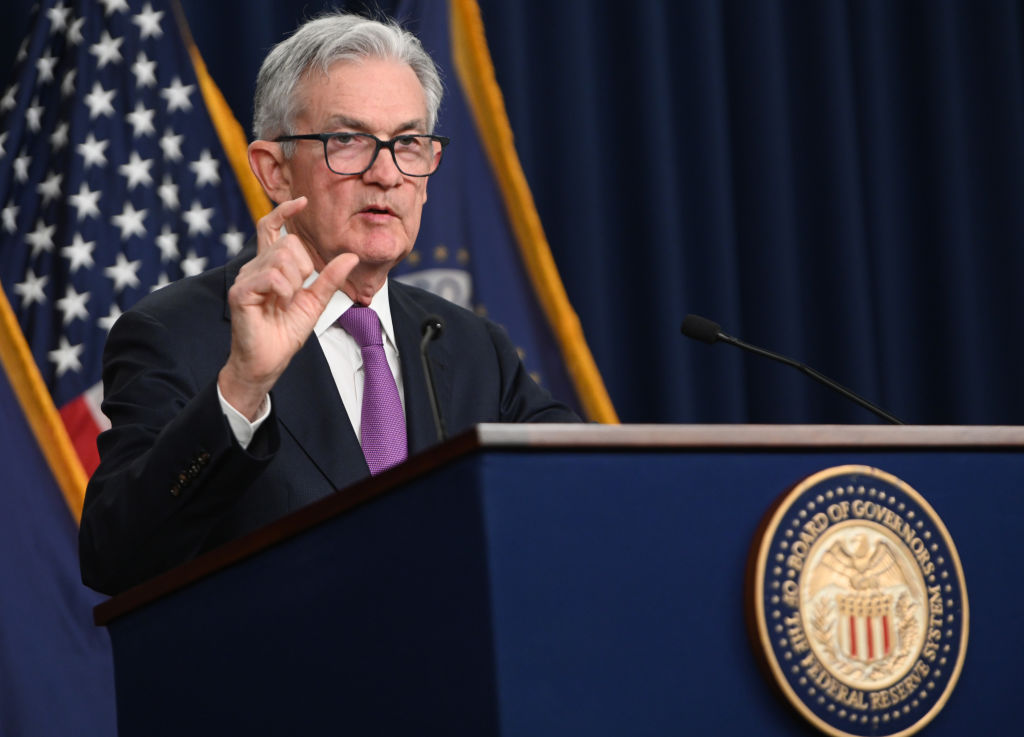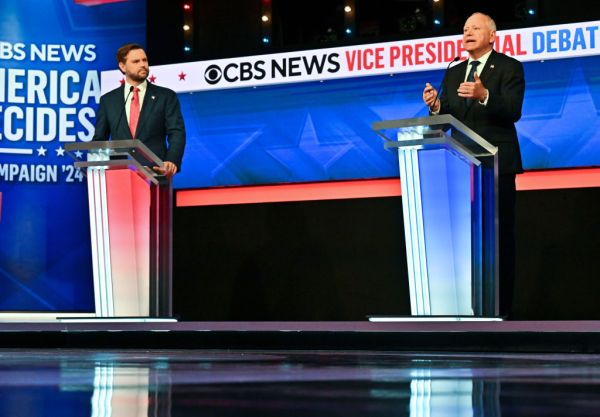Happy Thursday! To all of you in and around Des Moines, Iowa: Tonight’s the night! Steve, Declan, and Andrew are excited to see you at Twisted Vine Brewery, where there will be drinks on us for the first hour and a half, socializing with other members, and an hourlong Q&A with the Dispatchers. So bring your questions—and your friends!
Quick Hits: Today’s Top Stories
- Ukrainian President Volodymyr Zelensky criticized the United Nations during a speech to the U.N. Security Council Wednesday, saying the body had not fulfilled its remit of solving world conflicts. Zelensky argued that Russia should be stripped of its veto power on the council and called on the U.N. to back Ukraine’s 10-point peace plan, which Moscow has rejected. “Ukrainian soldiers are doing with their blood what the U.N. Security Council should do by its voting,” Zelensky said. “Veto power in the hands of the aggressor is what has pushed the U.N. into deadlock.” Zelensky will be in Washington today, where he’s set to meet with President Joe Biden at the White House, address senators on Capitol Hill, and make his first visit to the Pentagon to speak with U.S. military leaders, including Defense Secretary Lloyd Austin. He will meet privately with House Speaker Kevin McCarthy but will not address the House of Representatives.
- President Joe Biden met with Israeli Prime Minister Benjamin Netanyahu in New York City Wednesday, on the sidelines of the U.N. General Assembly gathering. It’s the first time the two have met since Netanyahu took office in December and comes after months of heightened tensions between the two leaders over the Netanyahu government’s attempts to reform Israel’s judicial system. “Today, we’re going to discuss some of the hard issues, that is upholding democratic values that lie at the heart of our partnership, including the checks and balances in our systems and preserving the path to a negotiated two-state solution, and ensuring that Iran never, never acquires a nuclear weapon,” Biden said.
- Armenian separatists and the Azerbaijani government reportedly agreed on Wednesday to a ceasefire in Nagorno-Karabakh—an ethnically Armenian breakaway region which technically belongs to Azerbaijan. The Russian defense ministry—an Armenian ally—reportedly negotiated the agreement, which ended the Azerbaijani military onslaught on the unrecognized state that began Tuesday and killed at least 32 people and injured some 200 more. Azerbaijani government officials say the deal will bring Nagorno-Karabakh fully under the regime’s control, dissolving the region’s army and handing over military hardware ahead of “reintegration talks” between Azerbaijan’s government and the separatists.
- Central bankers at the Federal Reserve held interest rates steady following their meeting this week, maintaining a 5.25 percent and 5.5 percent rate as they did in June. The Fed’s quarterly projection for 2024 has rates remaining tight and inflation returning to its 2 percent target in 2026.
- The Biden administration on Wednesday announced the creation of American Climate Corps, a job training program aimed at preparing as many as 20,000 young people to enter professions in “clean energy, conservation, and climate resilience related skills.” Participants in the program—which harkens back to New Deal-era work schemes—will be paid.
- Hunter Biden, the president’s son, plans to plead “not guilty” to three felony charges related to his alleged illegal possession of a revolver, according to a court filing Tuesday. The younger Biden had also requested that his first court appearance be made virtually, but U.S. Magistrate Judge Christopher J. Burke said Wednesday that Biden, who lives in California, must appear in person in the federal Delaware courtroom on September 26, because “any other defendant would be required to attend his or her initial appearance in person. So too here.”
- In testimony before the House Judiciary Committee Wednesday as part of routine oversight, Attorney General Merrick Garland defended his department’s handling of the investigation into Hunter Biden and maintained neither he nor the White House had interfered in those proceedings. “I’m going to say again, and again, if necessary, I did not interfere with, did not investigate, did not make determinations” in the Hunter Biden probe, Garland said.
- The Senate voted 83-11 Wednesday to confirm Air Force Gen. Charles Q. Brown Jr. as the next chairman of the Joint Chiefs of Staff to replace the outgoing chairman, Gen. Mark Milley, who is retiring at the end of the month. Republican Sen. Tommy Tuberville of Alabama has blocked the mass promotions—objecting during a process called unanimous consent—of some 300 other military officers over the Defense Department’s abortion policy. Senate Majority Leader Chuck Schumer had been reluctant to hold the vote for fear of seeming to appease Tuberville and in hopes that the Republican senator would back down. Votes to confirm Marine Corps Gen. Eric M. Smith and Army Gen. Randy George to lead their respective services will likely follow Thursday, circumventing Tuberville’s hold—a move Tuberville himself has called for.
- Former White House aide Cassidy Hutchinson says Rudy Giuliani, the former mayor of New York City and lawyer to former President Donald Trump, groped her on January 6, 2021, while she and Giuliani were both backstage at Trump’s White House Ellipse speech. She makes the claim in her forthcoming memoir and joins a former Giuliani employee in accusing the onetime presidential candidate of improper sexual behavior. Giuliani denies the allegations from both women.
- Kari Lake, the failed Arizona gubernatorial candidate and close ally of former President Donald Trump, is reportedly set to launch a bid for Senate in October. Independent Kyrsten Sinema has not said whether she’ll run for reelection, and Rep. Ruben Gallego is seeking the Democratic nomination.
A (Sort of) Hawkish Pause

Federal Reserve Chair Jerome Powell sported his usual purple tie at the central bank’s September meeting Wednesday. Powell has worn a purple tie at five of the six Federal Open Market Committee (FOMC) meetings so far this year, throwing a curveball in March with an icy blue number. His wardrobe consistency has frustrated attempts by monetary policy nerds to read dovish or hawkish cues into the chair’s dress. Your Morning Dispatch editors’ preferred interpretation is that the purple represents a throwback to the garb of ancient Roman senators. (That’s how often we think about the Roman Empire.)
Imperial colors notwithstanding, the central bank paused its rate-hiking campaign again as inflation indicators have improved over the summer, but it signaled the potential for a future rate hike as economic growth continues to exceed expectations.
Worth Your Time
- The federal deficit—the difference between how much money the federal government spends and how much it brings in—is ballooning. Given the circumstances, that’s a little weird. “It’s not totally unprecedented to see the federal budget deficit double from one year to the next, as it seems to have done this year,” Eric Boehm writes in a piece for Reason. “But those occasions, at least in the past 50 years, have always corresponded with bad stuff happening to the national economy. Compared to those other historical examples, however, this year seems like an outlier. Unemployment is low, the economy has been growing steadily, and inflation has significantly abated. America does not seem to be in a crisis at the moment, but the government’s balance sheet certainly is. And it is that way, in large part, because of the government’s own programs—as opposed to, say, an external event like a pandemic or a mortgage crisis. The big difference, then, between this year and 2002 (or 1977 or any of the few other times in recent history when the deficit has doubled) is that the drivers of this year’s shocking deficit growth are not temporary problems. They are structural problems—either as so-called ‘mandatory spending’ or as a function of the borrowing the government has already done—that will continue to mount until they are meaningfully addressed.”
Presented Without Comment
RealClearPolitics: Trump: Megyn Kelly “Was Pretty Nasty” In Interview Last Week
Also Presented Without Comment
Washington Post: 96-year-old Judge Who Refuses to Retire Suspended for ‘Misconduct’
Toeing the Company Line
- In the newsletters: The Dispatch Politics crew reports on the pro-life movement’s Trump tightrope, Kevin explores (🔒) the right’s version of identity politics, Jonah explains (🔒) why so many men think so frequently about the Roman Empire, and Nick writes (🔒) in defense of the Senate dress code.
- On the podcasts: David Lat is joined by his husband Zachary Baron Shemtob in a special episode of Advisory Opinions to discuss the potential Trump gag order, the Google antitrust trial, and more.
- On the site today: Emma Rogers explains Sen. Tommy Tuberville’s military promotion blockade, and David Adesnik reviews Target Tehran, a book about Israel’s efforts to stymie Iran’s nuclear program.










Please note that we at The Dispatch hold ourselves, our work, and our commenters to a higher standard than other places on the internet. We welcome comments that foster genuine debate or discussion—including comments critical of us or our work—but responses that include ad hominem attacks on fellow Dispatch members or are intended to stoke fear and anger may be moderated.
You are currently using a limited time guest pass and do not have access to commenting. Consider subscribing to join the conversation.
With your membership, you only have the ability to comment on The Morning Dispatch articles. Consider upgrading to join the conversation everywhere.